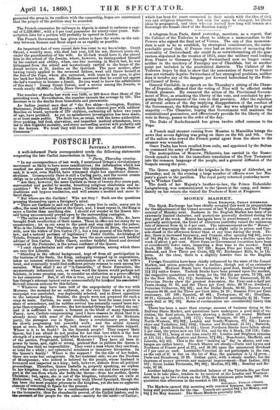POSTSCRIPT.
SATURDAY AFTERNOON.
A well-informed Paris correspondent sends the following statements respecting the late Carlist insurrection in Spain.
Paris' Thursday evening.
" In my correspondence of last week, I mentioned Ortega's revolutionary movement as likely to have some ramifications; the information which has reached me since strongly corroborates this intimation. Burgos, Bilbao, and, it is said, even Madnd, have witnessed slight but significant demon- strations. Consequently there is still a Carlisb party, and the recent events oblige us to acknowledge, if not its strength, at least its existence. " Are they, however, the same Carlists as those of twenty-five years past, surrounded and guided by monks, breathing religious absolutism and in- quisition ? We are far from such times ; Carlism is giving pp its obsolete traditions and bygone tendencies, and will assume a modem and more li- beral shape. " But where are the. Carlists ? Who are they ? Such are the questions pressing themselves upon a foreigner's mind. " There are Carlists in and out of Spain ; some live in exile, many are in office, the most influential are at the Court, and, I must repeat it, the King is more a Carlist than anything else. I should not wonder at the Queen her- self being unconsciously preyed upon by the surrounding contagion.
"The exiles are known : Count of Montemolin, Cabrera, Elio, &c. have brought fresh recollection of their names. Those in office are too many for an enumeration ; let us cut away to the quick and step right into the palace. Who is the Infante Don Sebastian, the eon of Princess de Beira, the second wife, now the widow of Don Carlos (V.), but a late general of his father- in- law , and a natural partisan of legitimacy ? Padre Cerillo, Archbishop of Toledo, Primate of the Kingdom, has been the most constant and faithful adviser of Don Carlos. Padre Claret, another faithful friend and devoted
counsel of the Pretender, is the actual confessor of the Queen. " I omit chamberlains and other grand dignitaries, among which there are very'few Liberals. " Standing in the official background, kept off from all participation in the business of the State, the King, unhappily wrapped up in superstition, takes no interest whatever in the maintenance of a crown on his wife's head, and eventually would find sufficient private reasons to rank among her enemies. What shall I say of " la Camarilla," of Sorer Patrocinio, the mysteriously influential nun, on whose word the Queen would perhaps not hesitate, iu some pressing case, to consider an abdication as a peace-offering to her conscience? But, if all this is true, and you may depend it is, why has Ortega's attempt turned nut so unsuccessfully for himland his associate.? Several reasons account for this failure.
" Whatever may have been told of the unpopularity of the war with Morocco, the moment for an outbreak, at the very time when a glorious campaign was concluded, was deplorably selected, and in direct opposition to the national feeling. Besides, the people were not prepared for such a coup de main. Carlism, we must recollect, has been for some years in a state of somnolence, and its sudden revival has naturally caused more sur- prise than sympathy. However, the hot-headed Ortega has belled the cat,' and it is sufficient to create a ferment in the blood of many Spaniards. Fancy, now, Carlista compromising (and I have reasons to think that it is already done) with some of the dissatisfied members of the Moderate party, the strongest one in Spain; fancy a revolutionary press doing ate slowly progressing but powerful work ; and the actual dynasty must at once, for safety's sake, look around for an immediate support. Where is it to be found ? In the Spanish people ? They respect their 'Queen, but I am afraid do not profess for her that love which is the best strength of a sovereign, especially when that sovereign is a woman. In any of the parties, Progressist, Liberal, Moderate ? They have all been in power by turns, and, right or wrong, pretend that in politics the Queen is nothing less than an impossibility. They want a man whom they can trust, -at least for a while ; not ephemeral ministers or transitory. favourites. In the Queen's family > Where is the support ? On the side of her father, there are none but antagonists. On her maternal side, we see the Duchess of Montpensier, who indeed is beloved by the people, whose husband is honoured and respected aa a king ; both, however, abstain from all political proceedings. Therefore, Queen Isabella is, properly speaking, an orphan in her kingdom ; the only person from whom she can and does expect sup- port is the one from whom she holds the throne—from her mother, Queen Christina; but, again, she is out of the kingdom, voluntarily an exile at Malmaison ; and, though she is the only truly liberal Spaniard, though she has been the most popular princess in the kingdom, yet she has no apparent chances of returning to Spain for the present.
" The immediate hope, for a continuation of the present dynasty reside in the incapacity, thus far abundantly proved, of the Carlist leaders, and in
time aversion of the people for the name—merely for the Carnet ; which has been for years connected in their minds with the idea of civil war and religious despotism. Let only the name be changed, let liberal ideas be propagated, and then who can foretell how long will remain as a Sovereign the female chief of the Bourbon family ?"


























 Previous page
Previous page